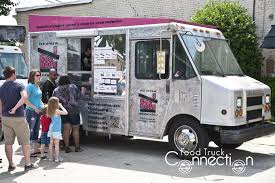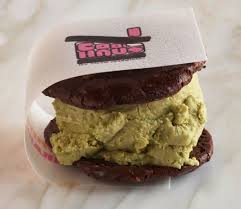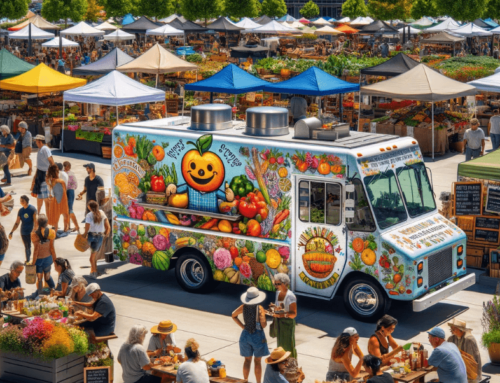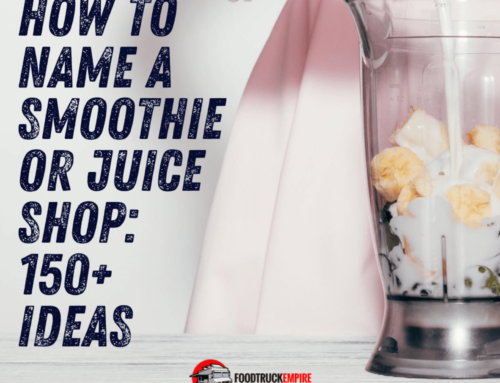Who doesn’t love the sinful aspect of desserts? No matter what some may say and protest to this sugary cuisine, I think we all have a hidden sweet tooth simply waiting for another serving of chocolate or ice cream. Sometimes we just can’t help but give in to this craving, wrapping our souls in a big hug as our mouths do a happy dance around our favorite high-inducing treat. It’s as such not so surprising to see the many businesses that have soared to legendary success in riding these guilty pleasures, particularly the ice cream stores, candy shops, and donut-centric bakeries.
How so is it then, that if we were to look at the masses of Food Trucks that fill our country’s streets, the percentage of Dessert Trucks compared to Savory is so relatively low? When done well enough, they seem to survive just as well, and what idea is more appealing in business start up than making your own ice cream? Maybe there’s a balance issue, like an ecological mix of species that waver around certain levels in population (too much of one negatively impact its own species), or too many people more interested in savory truck startup (how, how I tell you!? Blasphemous), or perhaps some unknown difficulties in operating these sugar-run vehicles. Whatever it is, the sad result is not just a lacking of dessert stops in certain cities for the food truck-obsessed, but a notably shrunken pool of resources one can naturally draw from for advice, inspiration, and understanding when looking to operate a truck of the same style. Whereas savory trucks abound in the industry and news, one would have to look a little further if hoping for help in starting a truck of frozen or cake inspiration.
Due to this, I thought it might be a fun and nice opportunity to sit down with a few of the successful owners in the dessert truck lineup and ask them some questions concerning the industry for the sweet-minded. Hopefully any future entrepreneurs in sugar-on-wheels ventures will be able to take some of what’s said to aid any part of their planning, or at least soothe some worries one might have. Joining me in this is Alexander Ali, Public Relations Manager at Coolhaus; Karen from the vegan-friendly Like-No-Udder; and Grant Di Mille from Sweetery NYC. Together they all had a lot to say on the various subjects, so let’s get started!
Question: I gotta start off asking about the business. How did the truck start out and get into the business?
Coolhaus: I was working at Walt Disney Imagineering when I met Freya. I have seven years of architecture academic training and noticed a disconnect between the general public and design so I started baking cookies and making ice cream to build ice cream sandwiches and naming them after famous architects and architectural movements. In 2009, Freya and I bought an old postal van and took it to Coachella where we had an audience of 100,000 people. When we got back to L.A. after Coachella, we had a huge fan base and a lot of press!
Like No Udder: Like No Udder opened in mid-2010 after several years of research and dreaming. I’ve always had an entrepreneurial drive, and being vegan, I knew whatever I did would surround that lifestyle. I am originally from NY, where soft serve is king. In my memory, the idea didn’t come as an epiphany – it was just a natural direction to head in. I love soft serve, it is not an easy product to find (dairy free) and I wanted to work for myself. Bringing a delicious product to the market that makes people happy is what drives me.
The truck itself came completely outfitted as a soft serve ice cream truck. I bought it used from Craiglist and was basically ready to go from day one. Of course with any used equipment, I have had my share of ups and downs, repairs and learning curve. Anyone who tells you that owning a food truck is easy is delusional. It’s hard work
SweeteryNYC: After 25 years of spending my life in the advertising industry as a business developer, as it revolved around printing, my partner and I decided we wanted to change and start our own business. We noticed the trend of higher end food trucks and bought into it. We turned our business into an experiential marketing company, where we connect major clients and brands to consumers; the business would have actually failed if we hadn’t done this (I got fired by my partner five months in!)
Q: Coolhaus, It’s not a stretch to say your expansion has been huge, exactly what was it that led up to that, and how did the team go about growing (how was it handled)?
C: We grew pretty fast partly, I think, because our timing was perfect. We were the first to market with a gourmet truck and geographic-based tweeting was just becoming popular. At first, the most difficult part of our truck expansion was knowing what questions to ask when looking at different markets. Over time, we built up better intuition and asked the right questions, about health codes and municipal boundaries, right off the bat.
Q: There are tons of successful, cult-followed Lunch and other savory trucks throughout the country, why did you choose to stick with desserts?
C: We really wanted to make the brand as fun and innovative as possible—we just saw desserts, specifically ice cream, as having a broad-ranging audience, and as a great canvas for experimenting with flavor and, in fact, bringing savory components back into the dessert category. In my childhood home, ice cream was a no-brainer after dinner!
L: I had worked in catering for years with a very successful local company. I learned through the time I was there that production of savory food is just not my cup of tea. If I had a different personality, there is no question that I would have pursued a savory vegan truck. In Rhode Island where I live, I feel that this could be very successful. But if I am being honest with myself, I just don’t have the passion for that. There is/was simply nothing like what I’ve developed in the area (or the world for that matter). Like No Udder is the world’s only vegan soft serve ice cream truck, as far as I know. There is simply a need for what the truck offers.
S: Well I think that was more of a passion for my partner, had baking in her heritage and background. We wanted to do something different, thought that it’d be an interesting concept to be more sweet than savory, cuz there were already a lot of savory trucks (though not to the extent that we are now). I had no idea what I was thinking, haha; five and a half years later, though, the business is still standing.
Q: What reasons are there you think a new business owner SHOULD consider starting a Dessert Food Truck?
C: The food truck business is great because there it’s flexible. They bring new life to traditional food concepts. It’s just like any other startup company environment–creative, energetic and fun.
S: Opens you to having a lot more personal engagements: you’re more apt to be invited to weddings, bar mitzvahs, social events in people’s backyards. They’re not huge moneymakers, but they definitely fill in. There are also so many savory trucks on the road, you gotta do something more creative.
Q: How would you consider equipment concerns for various Dessert Trucks differ than their lunch-themed counterparts? Is it easier or harder to gather, and what’s it like trying to find used and fully-stocked trucks (that you’re aware of)?
C: It is a little more simple and cheaper to open a dessert truck, as far as equipment—you just need to be sure the freezer can withstand bumps and turns in will endure in the truck, and that the plumbing is sound. Other than that power requirements are lower and there’s no grease to dump, which is a good thing.
L: Of course equipment is different from sweet and savory trucks. My truck came equipped, so I can’t speak much to the question. But I will say that with a specialized piece of equipment like a soft serve machine, there are higher costs involved than simply a freezer. Soft serve machines inherently have problems, which I found out after starting the business. Every machine is different. The complaint I hear most from trucks is generator issues, which I do not have. I run equipment from a power take off from the engine. There are probably used trucks to be found on-line, but my concern would be their age. I searched for several years before I found one that I felt was not too old.
S: I like the fact that you can bake things on the truck, it speaks of quality and freshness, you can do events for thousands of people and, if you run out, you can easily bake stuff off. We have a full-sized convection oven on the truck, what I originally wanted.
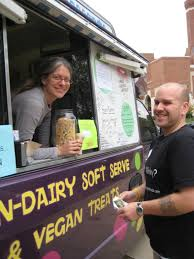 Q: Do you have to deal with different city regulations than other trucks might?
Q: Do you have to deal with different city regulations than other trucks might?
L: I deal with the same regulations, but probably have a lot less hassle than savory trucks. What I offer is generally considered less of a food hazard issue. I am not heating foods, nor do I have cross contamination issues dealing with raw proteins. I make sure my refrigeration is always at the proper temps and take care to keep allergens separate from one another. Being non-dairy where I live makes life easier.
Q: One of the biggest aspects of Food Truck business is that they’re usually, outside of events, on the streets a few hours for the Lunch period rush. However, one wouldn’t expect there to be much demand for middle-of-the-day sweets, especially something that needs immediate consumption like ice cream. HAS this been something you’ve needed to consider and overcome, and if so how do you do it?
C: You would be surprised by how many people enjoy a mid-day ice cream treat! If your product is good, consumers will come. Everyone likes to treat themselves, no matter what time of day.
L: This is really insightful to note. This is exactly true. Of course when you start a business, you think that what you have is the best and people will want it all the time. With frozen desserts, that is just not the case. There is no one time to enjoy ice cream. You can’t take soft serve to go and save it for later. It is a point of purchase item to enjoy. Unlike cupcakes or pints of ice cream, you have to eat it right away. My challenges are probably different than a pastry truck. I have discovered over the years that street service can be hit or miss. Public and private events are definitely what keep Like No Udder going. The positive side to running my ice cream truck is the hours I work. I don’t have to get up crazy early to prep and my hours are typically late afternoons, evenings and weekends. That works for me. The negative is not having a regular schedule like savory trucks. I do get frustrated sometimes not having a regular route/stops. But being flexible has opened me up to interesting opportunities.
S: Yeah you have to consider that. From the early stages, we turned our business into a truck that sells great, fair-trade coffee, that helps with the baked goods in the morning. We do sell some savory food on the truck, not a lot, quiches and ham n cheese croissants.But yeah you have to factor that in, your work day is definitely different. People have to eat lunch, but they don’t have to have treats, but it’s a feel good thing, for a couple bucks you can have something really delicious. It’s an impulse buy, that’s a lot of what we relied on on the ground.
Q: Would you say there’s any advantage or disadvantage for dessert trucks being parked next to a lineup of savory trucks vs finding their own independent spot on the street? What do you usually shoot for, and how do you ensure it happens?
C: Definitely an advantage—you can cross-promote and do lunch/dessert specials. It’s a great way to build relationships.
L: I really think it depends on what city you live in. I have not found an advantage or disadvantage either way. Of course a bunch of trucks at events is always a draw. I prefer for all food to be in one place at events so folks can clearly see in one shot what they have on offer.
S: I do think the savory and sweet trucks augment themselves and can be good for business. In New York it’s a bit different, parking is really a challenging situation. I have to be honest, most of our profits don’t come from the street, it’s not where we make our money; where we travelled all over for the first year and a half, we now have a fixed location. It’s OUR location, we’ve built up a great following; we could make more money travelling and moving around, but to me it doesn’t make sense considering where we are right now.
Q: Jumping off from the street-based questions, how important is it for dessert trucks to participate in events and catering opportunities, and what suggestions do you have for others to go about doing so?
L: My experience is that events are the most important part of a dessert truck’s income, or at least that has been the case for me. I do spend a decent amount of money to participate in events, but if it is the right event, you’re bound to make sales and it will be worth taking that financial risk. No question though that any time you pursue an event (fee or no fee), you have to ask questions of the event organizer. Will there be other similar products? How many people are you expecting to attend? What happens in inclement weather? No doubt, you’ll spend time the first couple of seasons trying events out to see if they work for your product. Some will be amazing and others total duds. Looking in the local papers, weekly/monthly magazines, on-line and at flyers at coffee shops can be a good way to find events. Private events are a different story. That has been a bit more challenging – it’s word of mouth mostly. Having a specialty item may work against me in some cases.
S: We derive the majority of our revenue from corporate events, corporate catering, and the marketing events, they’re huge. You have to be able to be passionate about your business, be overly enthralled and strive for excellence. What I do with the truck is an ‘elective,’ not a necessity, they don’t have to have a truck at the end of their wedding or bar mitzvah, but it’s an experience.
Q: What other challenges do sweet-based and frozen-product Trucks usually have to consider, and do you have any suggestions for overcoming them?
C: Keeping temperature consistent for maintaining product texture and flavor, and on a hot day—that’s particularly difficult to do.
S: Frozen trucks are much more seasonal (and if you’re in New York there’s the Ice Cream Mafia goons to consider… sadly not a joke). Just be excellent at what you do, be as good as you can possibly be in the realm you’ve chosen, try to find a niche and realize you can’t be everything to everybody.
Q: From what I can tell, there are two kinds of Dessert Trucks: those that stick with a single kind of item, such as cupcake, cookie, ice cream or fro-yo trucks; and then there are those that offer a variety, like bakery-themed, ‘gourmet dessert’, or ‘ice cream shop’ trucks that have the cookie sandwiches, pops, etc. Do you think, or would you suggest, that either of these styles is better than the other?
C: I would actually say our truck menu is fairly simple, with limited input, infinite output. We do have bars and delicious hot and cold drinks (shout out to Stumptown coffee which is particularly good for our affogatos!), but mainly we serve ice cream sandwiches, scooped to order, in edible wrappers. It’s nice to have a streamlined menu when you’re out on the street.
L: I can only go on my own experiences, which has been with just soft serve and frozen lemonade (a Rhode Island version of a slushie). I do have a feeling that offering novelties and soft serve on the truck could be a conflict. The soft serve machine is so expensive that taking sales away from that product, by selling other items, could be a conflict. But I always have people asking me for novelties, so perhaps I am missing out on sales. I couldn’t say that one is better than the other, but I do feel that keeping the menu simple is important. Offering to much can be a liability.
S: I’ve recognized early on that our truck is confusing to people (our business also), obviously anytime you can keep it simple with consumers, people can understand it better. For example, the name of my company implies ‘sweet’ right off the bat.
Q: What advice do you have for those who want to start up a Dessert Truck, but still don’t know what they want to sell? How do they ‘find their product,’ and what considerations do they need to take into place so that it’s successful on the street?
C: My advice is to take time–a lot of time–to research the food and food truck industry. Think about what will make you different from the thousands of other food trucks, who you will service and what you want the brand to be.
L: All I can say is to sell what you feel passionate about. A business will never work if you don’t really believe in your product. For me, being vegan is the driving force. Plain and simple, if what you’re selling is delicious, people will come. It will take time to build a clientele, but word will get out. So anyone starting a truck, sweet or savory, be realistic that retirement is not around the corner. Owning a specialty truck like mine may be more of an uphill battle than the traditional, but I wouldn’t change my path. It’s what I believe in.
S: I think you have to follow trends to a certain degree, can’t live on them since they tend to die out fairly quickly (particularly in major cities), you have to pander a little bit but you have to be in a position where you’re offering something familiar, comfort food. As much as we sell so many things on the truck, one of the most popular items is chocolate chip cookies; they love chocolate chips cookies, it’s easy, they don’t have to think about it.
Q: I’ve always found that having a strong personality is key for having a popular food truck, and it seems practically a necessity if one wants a sweets truck that’ll even survive. What’s your experience and opinion of this, and how can someone make sure they’re more than just a trendy-looking cupcake van?
C: Having a strong brand is essential for any business. Have a vision that goes beyond one product or market instead of focusing on one trend.
L: In the case of Like No Udder, the product we’re selling is unique. We don’t have direct competition, so the ice cream sort of sells itself. My husband and I do go out of our way to provide great customer service and have become friends with many of our customers. We also try to be a local resource for all things vegetarian, so we use the business to spread information on happenings in the area. We hold a couple of social events a year to bring the community together.
Q: All this aside, at the end of the day, what’s your favorite part of being part of an ice cream truck?
C: My favorite part is the people I work with. I have a great team and I’ve been able to connect with so many businesses because of Coolhaus. It’s inspiring to meet so many friendly, creative people who love our ice cream!
L: No question, ice cream makes people happy. Unlike savory food trucks, a dessert truck is bound to be the extra special factor at an event. What I sell is not a necessity – people buy because they enjoy it.
Q: Finally, you don’t happen to have any weird and funny stories for us to listen to?
C: The first time we took the Coolhaus truck out, on the way to Coachella, it broke down. We had to get AAA to tow us the rest of the way!
L: The following is not a funny or weird story, but is a poignant observation about my customers. Because I am an allergy friendly truck, I find that my customer base is quite varied. Sometimes I think someone approaching the truck has no idea that they are at a dairy-free truck, when it is quite the opposite. They know exactly what I serve and are there for a reason. They can’t eat dairy or gluten or choose not to, and are so excited to finally have a place they can go to have a normal experience. Kids who have NEVER been to an ice cream truck because they have food allergies are finally not left out. I find this the most gratifying part of my job.
As usual, I’d like to extend a big thank you for all the trucks and owners who took the time to help me get this project of mine completed. I’ve truly been thinking that our Dessert Trucks deserve to be featured, and we were able to do that today. For the readers out there, good luck to you in rewarding your sweet tooth and filling out those business aspirations. Now if you’ll excuse me, there’s some rocky road calling my name this evening.


